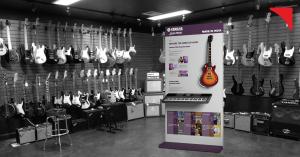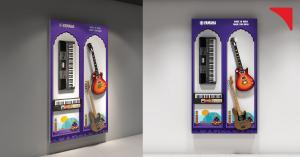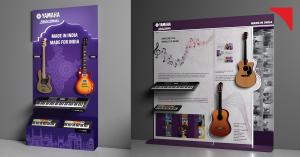D’Art Redefines Yamaha Music’s Identity with Cultural Retail Fixtures
D’Art Design reimagines Yamaha Music’s retail identity with fixture-led fitouts, blending Indianness and global standards for immersive customer experiences.
The design agency collaborated with Yamaha Music for its retail transformation journey that was mainly focused on developing customized retail fixtures and full spectrum fitout services. The main objective was to not just present Yamaha’s musical instruments but to narrate their presence in terms of visibility, spatially, and emotionally.
A Longstanding Partnership Shaped by Evolving Market Needs
Yamaha Music has been a regular client of D’Art since the very inception of the agency. This long standing collaboration has allowed both brands to develop a mutual understanding of what the Indian music retail ecosystem demands. In recent years, as consumer inclination toward Indian origin brands surged, Yamaha Music sought to authentically embody “Indianness” across all touchpoints.
This ethos was not limited to product design or local sourcing; it extended into Yamaha Music 's retail expression. The music brand wanted to elevate its retail presence in a way that it naturally connects with its target audience (professionals, mid level strugglers, and aspirants) who often view music not just as a passion but as an aspiration.
Understanding the Challenge: A Retail Environment in Clutter
D’Art’s first step in redefining Yamaha Music’s retail identity involved activating its research and planning services. Ground level audits revealed a startling truth: nearly 90% of music stores across India were heavily cluttered. Retail spaces were often multipurpose zones where repairing, billing, selling, and showcasing converged into a single physical narrative. All this left only a little bit of room for customer experiential discovery.
For Yamaha Music, whose instruments rely on tactile interaction and visibility to drive purchase decisions, this retail environment was counterproductive. Instruments were simply stacked instead of being showcased. Walkways were brutally congested. Brand presence was muted, often lost in the middle of the visual noise of competing displays.
Moreover, the absence of intelligent planogramming meant that customer journeys remained unstructured. There was no clear narrative guiding a visitor from curiosity to conversion. The insight was clear: Yamaha Music’s superior product quality could only resonate if its in store presence was restructured—both visually and functionally.
Developing a Retail Fixtures Solution Rooted in Culture, Function, and Strategy
D’Art’s response to this challenge was layered and deliberate. The agency followed an approach that included a blend of local sensibilities with strategic foresight and global retail standards. Their strategy was not just about designing store fixtures and providing shop fitout services. Instead, it was about redefining Yamaha Music’s retail voice in India.
First, spatial planning became the cornerstone. D’Art Design started with studying customer behavior within restricted retail environments in order to map product interaction patterns. The team identified dead zones, high engagement corners, and transition pathways within partner stores. The collected data was further used to develop fully functional zones where each instrument category could achieve its own spotlight.
Then came the part of retail fixture design—where storytelling met structural integrity. Inspired by India’s heritage and Yamaha Music’s minimalistic branding, the fixtures were fabricated using robust iron structures. Apart from promising durability, this utilization of iron metal gave a premium finish that perfectly aligned with Yamaha Music’s global aesthetic. The subtle inclusion of brand colors and earthy tones reinforced Yamaha’s commitment to a “Make in India, Made for India” identity.
Once the fixture design was completed, it was now time for shop fitout. From technical drawings to installation, D’Art’s in house team managed the entire implementation cycle. They ensured that irrespective of the size and location of the partner store, all Yamaha Music outlets deliver a consistent, elevated, and seamless retail experience to customers. Every store, large or small, began to reflect a cohesive retail identity, which was no less than being quietly powerful, functionally efficient, and distinctly Yamaha Music.
“Retail today is not just a display of products; it's a representation of brand ideology,” said Sameer Khosla, the global design director at D’Art Design. “Our collaboration with Yamaha Music is all about mutual trust and a shared commitment to delivering meaningful as well as impactful retail experiences. By weaving local relevance into global standards, we ensured Yamaha’s presence is not just seen but felt by Indian customers across segments.”
A Measurable Impact on Brand Experience and Customer Engagement
The results of this spatial overhaul were evident across partner stores. Effective design and installation of retail store fixtures led to better customer navigation and longer dwell times. Products that were once displayed in a complicated manner now commanded attention. This initiative collectively encouraged and supported product discovery, further allowing even first time customers to engage with Yamaha Music instruments without any additional assistance.
What once were chaotic retail setups evolved into structured, welcoming environments. Retail partners observed a noticeable increase in customer satisfaction and product inquiries. For Yamaha Music, this retail transformation project was a solid hit as it did not just improve the overall visibility but also increased the preference of Yamaha’s musical instruments. Also, even though the objective was to capture every segment of target audience, the retail partners noticed a significant increase in customers that were younger aspirants and mid level musicians. This is because these two segments were early looking forward to investing in reliable equipment with emotional and aspirational value.
“Our partnership with D’Art has allowed us to extend our commitment to Indianness far beyond production,” said a representative from Yamaha Music India. “It now lives in our stores, in the way we engage with our audience, and in how our instruments are discovered.”
Research and Planning: The Unsung Backbone of Success
While fixtures and fitouts often steal the spotlight in retail transformation, it was the robust research and planning services that laid the foundation for success. D’Art’s ability to understand the micro dynamics of Indian retail, starting right from store owner behavior to regional space constraints, enabled customized solutions that were both scalable and practical.
These robust preparations ensured that fixture innovation was not done on a theoretical basis. But instead, it was a real world execution ensuring perfect fixtures, walkways that made sense, and brand visibility that translated into customer action, which further resulted in a seamless integration of strategy and design.
Looking Ahead: A Blueprint for Brand Led Retail in India
Yamaha’s retail revamp in India stands as a case study in brand led spatial transformation. In a market where consumer expectations are evolving rapidly, Yamaha’s approach—executed in collaboration with D’Art Design—sets a benchmark for thoughtful, rooted, and well executed retail design.
About Yamaha Music
Yamaha Music is a part of Yamaha Corporation. It is a Japanese company that has a long history of making musical instruments. The brand has been operating in the Indian markets since a long time ago. It offers a wide range of musical instruments, including keyboards, guitars, drums, and other sound equipment. With a strong belief in the “Make in India” idea, Yamaha Music combines global quality with local needs, making music more exciting and easier to access for everyone.
About D’Art Design
D’Art Design is a 360 degree retail marketing and branding agency, serving global clients across diverse industries. With a strong presence in 8+ countries, 60,000+ retail stores delivered, and 350+ happy clients till date, the firm specializes in space design and retail rollouts that transform brands into immersive destinations for customers that provide them with incredible retail experiences.
Chiranjivi Rajhans
D'Art Pvt Ltd
email us here
Visit us on social media:
Facebook
X
LinkedIn
Instagram
YouTube
Other
Legal Disclaimer:
EIN Presswire provides this news content "as is" without warranty of any kind. We do not accept any responsibility or liability for the accuracy, content, images, videos, licenses, completeness, legality, or reliability of the information contained in this article. If you have any complaints or copyright issues related to this article, kindly contact the author above.
Foundry512 Expands Talent Roster, Hiring for Key Roles Across Media, Accounts, Projects, and Creative
Turner Home Team Expands Home Buying Services Statewide: We Buy Houses Across North Carolina fast for cash.
Sullivan’s Castle Island and Castle Island Brewing Co. Launch 'Rickey Business' Lager to Celebrate James Beard Award
Kalendarium
Więcej ważnych informacji
 Jedynka Newserii
Jedynka Newserii

 Jedynka Newserii
Jedynka Newserii

Prawo

KE proponuje nowy Fundusz Konkurencyjności. Ma pobudzić inwestycje w strategiczne dla Europy technologie
W środę 16 lipca Komisja Europejska przedstawiła projekt budżetu na lata 2028–2034. Jedna z propozycji zakłada utworzenie Europejskiego Funduszu Konkurencyjności o wartości ponad 400 mld euro, który ma pobudzić inwestycje w technologie strategiczne dla jednolitego rynku. Wśród wspieranych obszarów znalazła się obronność i przestrzeń kosmiczna. Na ten cel ma trafić ponad 130 mld euro, pięciokrotnie więcej niż do tej pory.
Firma
Były prezes PGE: OZE potrzebuje wsparcia magazynów energii. To temat traktowany po macoszemu

Choć udział odnawialnych źródeł energii w miksie energetycznym Polski jest stosunkowo wysoki i rośnie, to ten przyrost jest chaotyczny i nierównomiernie rozłożony miedzy technologiami – wskazuje Forum Energii. Dodatkowo OZE potrzebują wsparcia magazynów energii, a zdaniem Wojciecha Dąbrowskiego, prezesa Fundacji SET, ten temat jest traktowany po macoszemu. Brak magazynów powoduje, że produkcja energii z OZE jest tymczasowo wyłączana, co oznacza marnowanie potencjału tych źródeł.
Infrastruktura
Wzrost wynagrodzeń ekip budowlanych najmocniej wpływa na koszty budowy domu. Zainteresowanie inwestorów mimo to nieznacznie wzrasta

Budowa metra kwadratowego domu w Polsce kosztuje od 5,55 do 6 tys. zł w zależności od województwa – wynika z najnowszych analiz firmy Sekocenbud. Najdrożej jest w Warszawie, gdzie cena za metr kwadratowy domu przekroczyła już 6,2 tys. zł. Na przyrosty kosztów budowy domu wpływają zarówno drożejące materiały budowlane, jak i wyższe wynagrodzenia pracowników. Inwestorzy nie rezygnują jednak z budowy domów jednorodzinnych, co ma związek m.in. z wciąż wysokimi cenami mieszkań czy też obniżką stóp procentowych.
Partner serwisu
Szkolenia

Akademia Newserii
Akademia Newserii to projekt, w ramach którego najlepsi polscy dziennikarze biznesowi, giełdowi oraz lifestylowi, a także szkoleniowcy z wieloletnim doświadczeniem dzielą się swoją wiedzą nt. pracy z mediami.











.gif)

 |
| |
| |
|